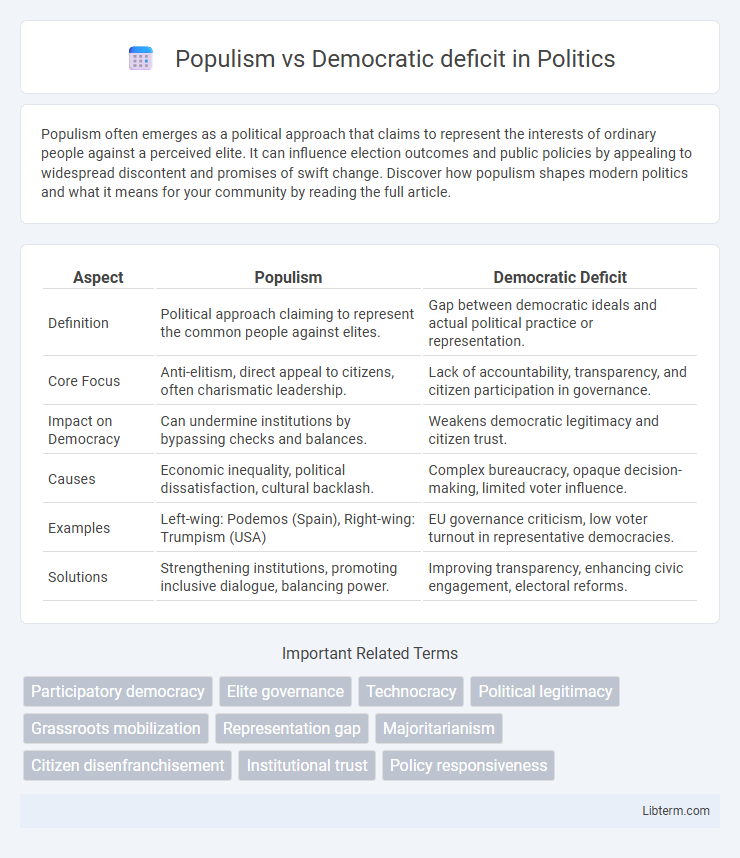Populism often emerges as a political approach that claims to represent the interests of ordinary people against a perceived elite. It can influence election outcomes and public policies by appealing to widespread discontent and promises of swift change. Discover how populism shapes modern politics and what it means for your community by reading the full article.
Table of Comparison
| Aspect | Populism | Democratic Deficit |
|---|---|---|
| Definition | Political approach claiming to represent the common people against elites. | Gap between democratic ideals and actual political practice or representation. |
| Core Focus | Anti-elitism, direct appeal to citizens, often charismatic leadership. | Lack of accountability, transparency, and citizen participation in governance. |
| Impact on Democracy | Can undermine institutions by bypassing checks and balances. | Weakens democratic legitimacy and citizen trust. |
| Causes | Economic inequality, political dissatisfaction, cultural backlash. | Complex bureaucracy, opaque decision-making, limited voter influence. |
| Examples | Left-wing: Podemos (Spain), Right-wing: Trumpism (USA) | EU governance criticism, low voter turnout in representative democracies. |
| Solutions | Strengthening institutions, promoting inclusive dialogue, balancing power. | Improving transparency, enhancing civic engagement, electoral reforms. |
Understanding Populism: Origins and Evolution
Populism originates from a political approach that claims to represent the common people against elites and established institutions, often emerging in response to perceived democratic deficits such as lack of political representation or socioeconomic inequality. Its evolution spans diverse global contexts, shifting from agrarian-based movements in the 19th century to contemporary populist parties capitalizing on globalization anxieties and institutional distrust. Understanding populism requires analyzing its ideological flexibility, mobilization strategies, and impact on democratic norms and institutions.
Defining Democratic Deficit: Causes and Manifestations
Democratic deficit refers to the gap between democratic ideals and the actual functioning of political institutions, often caused by lack of transparency, citizen disengagement, and weak accountability mechanisms. This deficit manifests in low voter turnout, limited public trust, and the concentration of power among elites, undermining the legitimacy of democratic governance. Factors such as complex bureaucratic processes, unresponsive political parties, and media bias exacerbate the erosion of effective representation and citizen participation.
Populism as a Response to Democratic Deficit
Populism often emerges as a reaction to democratic deficits characterized by public distrust in political institutions and perceived elite disconnection from popular interests. This phenomenon channels widespread dissatisfaction by promoting direct representation and challenging established power structures perceived as unresponsive or corrupt. By framing politics as a struggle between the "pure people" and a "corrupt elite," populism capitalizes on democratic shortcomings and demands increased transparency and accountability.
Institutional Trust: Erosion and Restoration
Populism often arises from a perceived democratic deficit, where citizens feel institutional trust has eroded due to unresponsive governance and lack of transparency. This erosion undermines democratic legitimacy, enabling populist leaders to exploit grievances by promising to restore power directly to "the people." Restoring institutional trust requires reforms that enhance accountability, transparency, and citizen engagement to rebuild confidence in democratic institutions.
Political Representation: Citizen Voices vs. Elites
Populism emerges as a response to the perceived democratic deficit where citizens feel their voices are marginalized by political elites, highlighting a tension in political representation. This dynamic often pits grassroots demands against established power structures, challenging the legitimacy of traditional institutions. Effective democratic governance depends on bridging this gap to ensure inclusive participation and responsive leadership.
Media Influence: Shaping Narratives of Populism and Democracy
Media influence plays a pivotal role in shaping narratives of populism and democracy by framing political discourse and amplifying populist messages through sensationalism and emotional appeals. Social media platforms enable rapid dissemination of populist content, often bypassing traditional gatekeeping, which contributes to misinformation and polarized public opinion. This dynamic exacerbates democratic deficits by undermining informed debate, eroding trust in institutions, and fostering political disengagement among citizens.
Economic Inequality and Its Role in Democratic Discontent
Economic inequality intensifies democratic discontent by undermining political trust and fostering perceptions of unfair representation, fueling populist movements that claim to challenge elite dominance. Wealth concentration diminishes the influence of average citizens in policymaking, exacerbating the democratic deficit as institutional responsiveness declines. Populism capitalizes on this gap by mobilizing marginalized groups who demand more equitable economic policies and greater political inclusion.
Populist Leadership: Strengths and Dangers
Populist leadership often appeals directly to the people's demands, enhancing political engagement and challenging entrenched elites, which can invigorate democratic participation. However, populist leaders may undermine institutional checks and balances, concentrate power, and marginalize opposition, creating risks of authoritarianism and democratic erosion. The balance between mobilizing popular support and preserving democratic norms is critical to preventing a deepening democratic deficit.
Policy Solutions: Bridging the Gap between People and Institutions
Addressing democratic deficits requires enhancing transparency and accountability within political institutions to restore public trust and reduce the appeal of populist narratives. Implementing participatory policymaking processes and fostering civic engagement ensures citizens have a tangible role in decision-making, bridging the disconnect between government actions and public needs. Strengthening institutional responsiveness through reforms that prioritize social equity and inclusivity directly counters the grievances fueling populist movements.
Future Prospects: Reinventing Democracy in a Populist Era
Future prospects for addressing the democratic deficit amid rising populism involve reimagining political institutions to enhance transparency, inclusiveness, and citizen engagement. Strengthening participatory mechanisms such as deliberative forums and digital platforms can bridge the gap between representative institutions and public demands. Embracing institutional reforms that prioritize accountability and mitigate the risks of populist oversimplification offers a path to revitalizing democracy in contemporary political landscapes.
Populism Infographic

 libterm.com
libterm.com